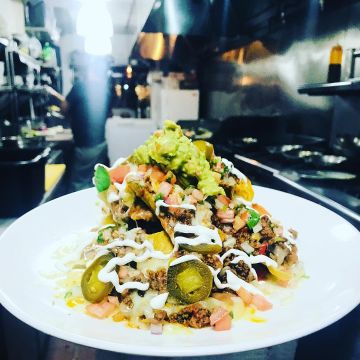Discover the heart of mexican food through classic recipes
Is Mexican Food Healthy And Balanced? Unloading the Nutritional Perks of Typical Ingredients
The concern of whether Mexican food is healthy invites an exploration of its conventional components. Beans and corn act as fundamental staples, abundant in healthy protein and fiber. Avocados offer useful fats, while various herbs and seasonings add flavor and health and wellness benefits - lunch and dinner. With each other, these components create a tapestry of nourishment. The healthfulness of Mexican cuisine frequently depends on preparation techniques and part dimensions. What duty do these factors play in identifying its general dietary value?
The Power of Beans: Protein and Fiber-Rich Staples
Although commonly overlooked, beans work as a keystone of Mexican food, providing a wide range of nutritional benefits. Rich in protein, they are an outstanding plant-based alternative for those seeking to meet their dietary protein needs. This high healthy protein web content supports muscular tissue repair service and development, making beans invaluable for both vegetarians and meat-eaters alike. Furthermore, beans are a remarkable resource of nutritional fiber, which aids in food digestion and advertises a feeling of fullness, possibly aiding with weight management.
The selection of beans utilized in Mexican recipes, such as black beans, pinto beans, and kidney beans, adds to a diverse flavor account and can improve dishes nutritionally. Additionally, beans are reduced in fat and consist of vital vitamins and minerals, consisting of folate, magnesium, and iron. With each other, these characteristics make beans a crucial component, providing both sustenance and sustenance in traditional Mexican fare.

Corn: a Versatile Grain With Nutritional Advantages
Corn stands out as a versatile grain basic to Mexican cuisine, celebrated not just for its culinary applications however also for its outstanding nutritional profile. As a primary active ingredient in recipes like tortillas, tamales, and pozole, corn offers crucial nutrients that add to a balanced diet plan. Rich in carbs, it works as a considerable power source, while likewise being reduced in fat, making it a positive choice for numerous nutritional demands.
Corn is a great source of dietary fiber, which aids in digestion and promotes satiation. It contains significant amounts of vitamins such as B-complex vitamins, which are essential for basal metabolism. The presence of anti-oxidants, especially carotenoids, contributes to general health by decreasing oxidative stress. Furthermore, corn is gluten-free, dealing with those with gluten level of sensitivities. On the whole, the nutritional benefits of corn highlight its value in typical Mexican food and its role in a healthy and balanced diet regimen.
Avocados: Healthy Fats and Nutrients in Every Bite
Avocados play a substantial duty in Mexican cuisine, complementing dishes with their velvety structure and rich flavor. Past their culinary allure, avocados are celebrated for their impressive nutritional profile. They are an abundant source of healthy and balanced monounsaturated fats, which can aid lower negative cholesterol levels and support heart wellness. Furthermore, avocados are loaded with essential nutrients, including potassium, vitamin E, and B vitamins, adding to overall wellness.
The high fiber material in avocados aids digestion and advertises satiety, making them an advantageous addition to any kind of meal. Their one-of-a-kind nutrient make-up can likewise jimmy johns hours support skin health and give anti-inflammatory advantages. Integrating avocados right into traditional Mexican dishes or appreciating them as a standalone snack can boost both flavor and nutrition, showing why they are a precious staple in Mexican food. Overall, avocados offer a scrumptious way to delight in healthy and balanced fats and important nutrients in every bite.

Flavors and Natural Herbs: Flavorful Health And Wellness Boosters
While taking pleasure in the rich tastes of Mexican food, one can not overlook the important function that spices and herbs play in boosting both taste and wellness. Active ingredients such as cilantro, chili, and oregano peppers not only add to the vivid flavor account but also provide considerable wellness advantages. Cilantro is known for its detoxifying buildings, aiding to eliminate hefty metals from the body, while oregano is loaded with antioxidants and has anti-inflammatory results.
Chili peppers, a staple in numerous Mexican recipes, include capsaicin, which has actually been linked to improved metabolism and pain relief. In addition, flavors like cumin and coriander support digestion and might help in blood sugar guideline. Including these flavorful wellness boosters into dishes not only boosts the culinary experience but additionally advertises total health, making Mexican cuisine not simply delicious, but likewise nutritionally advantageous.
Standard Food Preparation Techniques: Enhancing Nutrition and Taste
Conventional food preparation methods in Mexican cuisine play a vital duty in enhancing both nutrition and flavor, as they frequently prioritize classic methods and fresh ingredients. Strategies such as nixtamalization, where corn is soaked ny pizza and prepared in an alkaline option, not only improve the nutrient account of tortillas but likewise enhance their digestibility - hand crafted margarita. Furthermore, the usage of slow food preparation approaches, like cooking or braising, permits flavors to combine wonderfully while keeping the integrity of the components

Regularly Asked Concerns
Are Mexican Food Portions Normally Larger Than Various Other Foods?
Mexican food sections are usually larger than those of many various other cuisines. This particular reflects conventional eating techniques, stressing common sharing and hearty meals, which can bring about a more considerable offering dimension overall.
Exactly how Does the Prep Work Method Affect Healthiness of Mexican Food?
Preparation approaches substantially affect the healthfulness of Mexican food. Methods such as grilling or steaming preserve nutrients, while frying can boost harmful fat content. Choices of active ingredients and cooking designs eventually identify general nutritional worth.
Can Mexican Food Be Customized for Particular Nutritional Limitations?
Mexican food can certainly be tailored for certain nutritional constraints. Substitutions, such as utilizing corn tortillas for gluten-free diet plans or integrating more vegetables, make it possible for individuals to appreciate standard tastes while accommodating different dietary demands.
What Are Common Misunderstandings Regarding Mexican Food and Health?
Typical false impressions regarding Mexican food include the belief that it is naturally undesirable, overly hot, and solely concentrated on fats. In fact, standard recipes often include nourishing components and can be customized to numerous nutritional needs.
Are There Healthier Options at Mexican Restaurants?
Healthier choices at Mexican dining establishments often consist of barbequed meats, beans, and fresh veggies. Selecting meals that emphasize whole active ingredients and avoiding heavy sauces can bring about a much more nourishing dining experience, advertising total well-being.
The selection of beans used in Mexican meals, such as black beans, pinto beans, and kidney beans, adds to a varied taste profile and can improve dishes nutritionally. Avocados play a substantial role in Mexican cuisine, matching recipes with their luscious structure and abundant taste. Integrating avocados into typical Mexican dishes or enjoying them as a standalone snack can enhance both flavor and nourishment, demonstrating why they are a beloved staple in Mexican food. While delighting in the rich flavors of Mexican cuisine, one can not ignore the essential duty that spices and herbs play in improving both preference and wellness. Standard cooking techniques in Mexican cuisine play an important role in improving both nourishment and taste, as they typically prioritize classic techniques and fresh ingredients.